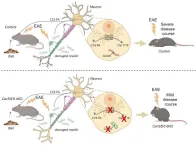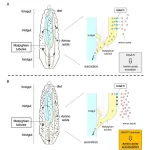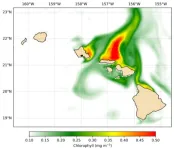(Press-News.org) NEW YORK, November 1, 2024 — Newly published research in the journal Glia has identified crucial links between dietary choices and the progression of multiple sclerosis (MS). The study, led by Patrizia Casaccia, founding director of the Advanced Science Research Center at the CUNY Graduate Center’s (CUNY ASRC) Neuroscience Initiative and Einstein Professor of Biology and Biochemistry at the CUNY Graduate Center, explored how enzymes called ceramide synthase 5 and 6 are responsible for the toxic effect of a palm oil-rich diet on neurons in the central nervous system, which causes a subsequent increase in the severity of MS symptoms.
MS is an inflammatory autoimmune disease marked by extensive damage to the insulating myelin sheath that protects nerves throughout the body. Current treatments focus on controlling the immune system's response, but the precise mechanisms contributing to neurodegeneration in MS remain poorly understood. Previous work from the Casaccia lab and others had reported on the toxic effect of high-fat diet on the severity of MS symptoms. In their study, researchers explored potential mechanisms by which a diet rich in palm oil may hijack neuronal health.
Neuroprotection From Palm Oil-Induced Toxicity
Using the experimental autoimmune encephalomyelitis (EAE) model of inflammatory demyelination, the research team found that diets high in palm oil led to a more severe disease course in mice.
“We reasoned that inside neuronal cells, palm oil is converted into a toxic substance called C16 ceramide by specific enzymes called CerS5 and CerS6,” said principal investigator Casaccia. “This ceramide is responsible for inflicting mitochondrial damage, which deprives neurons of the energy they need to counteract inflammation in the brain. We therefore asked whether inactivation of these enzymes would confer neuroprotection.”
The researchers found that when they genetically deleted the enzymes CerS6 and CerS5 in neurons they could prevent neurodegeneration in the experimental model of MS.
“This held true even when mice were fed a diet rich in palmitic acid,” said the paper’s co-first author Damien Marechal, a research associate with the Casaccia Lab. “This new information points to a specific metabolic pathway through which dietary fats can worsen MS symptoms.”
Significance for MS Patients and Clinicians
The paper’s findings have significant implications for individuals diagnosed with MS as well as for clinicians treating patients and neuroscientists researching the disease. The work reinforces that lifestyle choices, such as diet, can have a profound impact on the course of the disease. The study’s results build on previous concepts about careful dietary choices in managing the symptoms of MS. The findings also identify potential molecules that could help slow diet-induced symptom severity.
“Our research provides a molecular explanation for how to protect neurons from the palm-oil-dependent creation of molecules that harm them," said Casaccia. “We hope this information can empower patients to make informed dietary decisions that could positively impact the course of the disease, while identifying strategies to counteract the effect of cerS5 and CerS6 in a neuron-specific fashion.”
The research was funded by the National Institute of Neurological Disorders and Stroke of the National Institutes of Health (NIH).
About the Advanced Science Research Center at the CUNY Graduate Center
The Advanced Science Research Center at the CUNY Graduate Center (CUNY ASRC) is a world-leading center of scientific excellence that elevates STEM inquiry and education at CUNY and beyond. The CUNY ASRC’s research initiatives span five distinctive, but broadly interconnected disciplines: nanoscience, photonics, neuroscience, structural biology, and environmental sciences. The center promotes a collaborative, interdisciplinary research culture where renowned and emerging scientists advance their discoveries using state-of-the-art equipment and cutting-edge core facilities.
About the Graduate Center of The City University of New York
The CUNY Graduate Center is a leader in public graduate education devoted to enhancing the public good through pioneering research, serious learning, and reasoned debate. The Graduate Center offers ambitious students nearly 50 doctoral and master’s programs of the highest caliber, taught by top faculty from throughout CUNY — the nation’s largest urban public university. Through its nearly 40 centers, institutes, initiatives, and the Advanced Science Research Center, the Graduate Center influences public policy and discourse and shapes innovation. The Graduate Center’s extensive public programs make it a home for culture and conversation.
END
New research identifies ways to protect neurons from the negative effect of high-fat diet on multiple sclerosis progression
Findings suggest that specific enzymes in neurons mediate the toxicity of diets rich in palm oil.
2024-11-01
ELSE PRESS RELEASES FROM THIS DATE:
Boosting the nutritional value of black soldier fly larvae with biotechnology
2024-11-01
With the rapid increase in the global population, a "protein crisis" is expected in the near future, where the supply of protein will not be able to meet the rising demand. Fishmeal is the most common protein source that supports the production of livestock and aquaculture products, which are key protein sources for human consumption. However, global shortage of fishmeal and its rising prices have created an urgent need to find and secure an alternative protein source. Insects are gaining attention as novel protein sources ...
Medication decisions in pregnancy: A balancing act
2024-11-01
Most women use medication during pregnancy. Yet, selecting appropriate drugs and doses is challenging. In a new The Lancet article, physicians and researchers from the Radboud university medical center, Maastricht UMC+, Imperial College London, and the University of Liverpool introduce a shared decision-making approach combining ethical principles and a pregnant woman’s values with existing evidence. They use the example of sertraline, a commonly prescribed antidepressant in pregnancy, to illustrate the advocated decision-making process.
Although pregnant women often need medication, data on drug safety and efficacy in pregnancy remains limited. Historically seen as vulnerable research ...
Texas Tech researcher named Station Science Leader for Antarctica project
2024-10-31
Summary:
Texas Tech’s Natasja van Gestel has been named Station Science Leader by the National Science Foundation (NSF), enabling her to lead and coordinate research at Antarctica’s Palmer Station while advancing her work on climate change’s impact on glaciers. As a leader, she will oversee multiple scientific initiatives, manage resources and ensure compliance with the Antarctic Treaty’s regulations.
Why This Matters:
Climate Study: Her research contributes vital data on climate change effects in Antarctica, crucial for global climate assessments.
International Collaboration: ...
Restricting sugar consumption in utero and in early childhood significantly reduces risk of midlife chronic disease
2024-10-31
A low-sugar diet in utero and in the first two years of life can meaningfully reduce the risk of chronic diseases in adulthood, a new study has found, providing compelling new evidence of the lifelong health effects of early-life sugar consumption.
Published in Science, the study finds that children who experienced sugar restrictions during their first 1,000 days after conception had up to 35% lower risk of developing Type 2 diabetes and as much as 20% less risk of hypertension as adults. Low sugar intake by the mother prior to birth was enough to lower risks, but ...
Apixaban vs aspirin in patients with cancer and cryptogenic stroke
2024-10-31
New Orleans - Ochsner Health physicians Dr. Richard Zweifler and Dr. Joseph Tarsia are co-authors on a post hoc analysis carried out in the ARCADIA randomized clinical trial, comparing the effectiveness of apixaban versus aspirin in preventing adverse clinical outcomes in patients with a history of cancer and cryptogenic stroke. The research found no significant difference in the risk of major ischemic and hemorrhagic events between those taking apixaban and aspirin. The ...
Can magnetic pulses aimed at the brain treat insomnia?
2024-10-31
Traditional solutions for sleep disorders, including medications and cognitive behavioral therapies, often provide insufficient relief for military personnel, a problem researchers from the University of Arizona College of Medicine – Tucson will be hoping to solve with a $3 million grant from the Department of Defense Congressionally Directed Medical Research Program.
Sleep problems are among the top health concerns of military personnel, with an estimated 85% meeting criteria for a clinically relevant sleep ...
F.M. Kirby Research Center honors 25 years of pioneering brain imaging research
2024-10-31
BALTIMORE, October 31, 2024— Kennedy Krieger Institute is proud to celebrate the 25th anniversary of the F.M. Kirby Research Center for Functional Brain Imaging at Kennedy Krieger Institute, a leader in advancements and research in understanding the human brain.
Established in 1999 in partnership with Johns Hopkins University School of Medicine, the center has transformed neuroscience and medical imaging by developing cutting-edge magnetic resonance imaging (MRI) techniques that allow researchers to examine and measure brain function and structure ...
$1.75M CDC grant funds study to boost vaccine acceptance in Arizona’s rural, border communities
2024-10-31
Researchers at the University of Arizona’s Mel and Enid Zuckerman College of Public Health received a $1.75 million Centers for Disease Control and Prevention grant to conduct a community-based, participatory research study designed to improve vaccine uptake in Arizona’s rural and border communities.
Vaccination is a highly effective public health intervention that saves millions of lives per year, yet vaccination rates have declined in recent years for a variety of reasons, ranging from safety concerns to religious and philosophical objections.
“Vaccination is a cornerstone of public health,” said co-principal investigator Tomas ...
Immune system review provides insight into more effective biotechnology
2024-10-31
Macrophage cells are the immune system’s frontline soldiers, early on the scene to protect the body from foreign invaders. These cells answer the immune system's critical question for the rest of its troops: friend or foe?
As critical responders, macrophages can perceive helpful biotechnology as threats. If not created with the right materials or mechanical forces, these devices can trigger an immune response that can cause inflammation, scar tissue or device failure.
But what is the right material or the right mechanical force? In a meta-analysis co-led ...
Remote control eddies: Upwelled nutrients boost productivity around Hawaiian Islands
2024-10-31
Beyond colorful coral reefs and diverse nearshore ecosystems, Pacific Ocean waters surrounding the Hawaiian Islands have comparatively little marine life and low biological productivity. New research published by University of Hawai‘i (UH) at Mānoa oceanographers showed that eddies on the leeward side of the Hawaiian Islands can supply nutrients, not only locally, but also to the opposite side of the island chain and stimulate blooms of phytoplankton, microscopic plant life that lives in the surface ocean.
The study, published in JGR Oceans, was selected by the American Geophysical Union’s editorial board as a featured article.
“While ...
LAST 30 PRESS RELEASES:
USF study: Gag grouper are overfished in the Gulf; this new tool could help
New study from Jeonbuk National University finds current climate pledges may miss Paris targets
Theoretical principles of band structure manipulation in strongly correlated insulators with spin and charge perturbations
A CNIC study shows that the heart can be protected during chemotherapy without reducing antitumor efficacy
Mayo Clinic study finds single dose of non-prescribed Adderall raises blood pressure and heart rate in healthy young adults
Engineered immune cells show promise against brain metastases in preclinical study
Improved EV battery technology will outmatch degradation from climate change
AI cancer tools risk “shortcut learning” rather than detecting true biology
Painless skin patch offers new way to monitor immune health
Children with poor oral health more often develop cardiovascular disease as adults
GLP-1 drugs associated with reduced need for emergency care for migraine
New knowledge on heritability paves the way for better treatment of people with chronic inflammatory bowel disease
Under the Lens: Microbiologists Nicola Holden and Gil Domingue weigh in on the raw milk debate
Science reveals why you can’t resist a snack – even when you’re full
Kidney cancer study finds belzutifan plus pembrolizumab post-surgery helps patients at high risk for relapse stay cancer-free longer
Alkali cation effects in electrochemical carbon dioxide reduction
Test platforms for charging wireless cars now fit on a bench
$3 million NIH grant funds national study of Medicare Advantage’s benefit expansion into social supports
Amplified Sciences achieves CAP accreditation for cutting-edge diagnostic lab
Fred Hutch announces 12 recipients of the annual Harold M. Weintraub Graduate Student Award
Native forest litter helps rebuild soil life in post-mining landscapes
Mountain soils in arid regions may emit more greenhouse gas as climate shifts, new study finds
Pairing biochar with other soil amendments could unlock stronger gains in soil health
Why do we get a skip in our step when we’re happy? Thank dopamine
UC Irvine scientists uncover cellular mechanism behind muscle repair
Platform to map living brain noninvasively takes next big step
Stress-testing the Cascadia Subduction Zone reveals variability that could impact how earthquakes spread
We may be underestimating the true carbon cost of northern wildfires
Blood test predicts which bladder cancer patients may safely skip surgery
Kennesaw State's Vijay Anand honored as National Academy of Inventors Senior Member
[Press-News.org] New research identifies ways to protect neurons from the negative effect of high-fat diet on multiple sclerosis progressionFindings suggest that specific enzymes in neurons mediate the toxicity of diets rich in palm oil.





